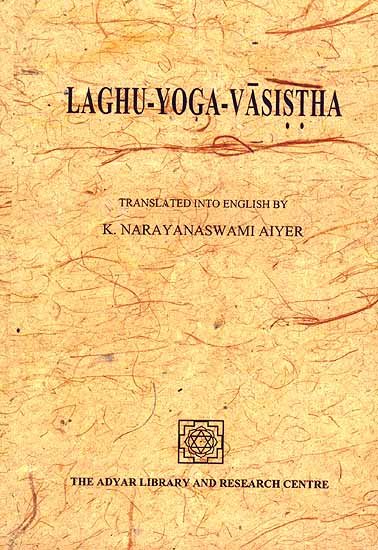Laghu-yoga-vasistha
by K. Narayanasvami Aiyar | 1896 | 137,618 words | ISBN-10: 818514141X | ISBN-13: 9788185141411
This page relates “the story of the deceitful indra”, the 5th part of chapter 3 of Laghu-yoga-vasistha (English translation). This ancient Sanskrit book contains epic legendry (similair to puranas and itihasa) and deals with the Advaita-vedanta (non-dual) branch of Indian philosophy. It is authored by sage (rishi) Valmiki and condensed (laghu) from an even larger work, forming a discourse between Vasistha (Vasishtha) and Rama. This part is included in the chapter “utpatti-prakarana”.
Part 5 - The Story of the Deceitful Indra
Summary. Having shown that the universe is nothing but the mind manifesting as such only through the potency of Brahman, the author now proceeds to illustrate, in this story, the fact that the body with its organs, etc., is no other than mind.
The creator of the incomparable worlds and the slayer of Ātma (the Real) is the mind only. The actions of the mind alone are, indeed, actions; but not so, those of the body.
In the previous narrative of the ten Brahmins related by the sun, they became Brahmā after performing Tapas in Padma posture and created the worlds. Who else than Brahmā can easily and truly understand the wonderful potency of the mind? The mind contemplating upon the body, becomes the body itself and then (enmeshed in it), is afflicted by it. The all-full Jñānis through the contemplation of Brahman within, are never affected by the pains assailing this body of nine gates. So indeed were, in days of yore, Indra and Ahalyā who were guilty of incest.
Here Rāma asked Vasiṣṭha as to who these two were. On which Vasiṣṭha continued: “In former times, there lived a king by the name of Indradyumna reigning over the country of Magadha. The lady that ministered to his enjoyment like his Prāṇa, was called Ahalyā. In that town abode a person named Indra. True to the tradition of the incestuous intercourse which occurred in former times between the once Ahalya and Indra[1] which the present couple of the same name had heard, the living couple began to have criminal intimacy with one another. Like two lovers who come in contact after long parting, she passed some days alone in the enjoyment of the company of her paramour. The king’s subjects who were eye witnesses to this scandalous affair reported it to the just king. On hearing which, he waxed exceedingly angry and caused the stray couple to be sunk into deep waters. Finding that this did not affect them in the least, he caused them to be subjected to many ordeals, such as trampling them with rutting elephants of fierce tusks, bathing them in flames of fire and beating them with hammers, etc. In spite of the infliction of all tortures, they did not evince the least symptoms of pain, but merely laughed at them, looking at one another with one-made mind as they sat opposite.
Extremely bewildered at the marvelous manner in which they baffled all his attempts to make them feel pain, he asked them the why of their being proof against all tortures. At which, the exulting pair breathed the following words ‘Oh thou of Atlantean shoulders, as our eyes are regaling them selves with the lunar ambrosia of one another’s face, we revel, within, in unimpeded bliss and hence are entirely oblivious of our body. While so, is it possible for us to (feel any pain or see our body)? We never experience the slightest pain, even when the body is ripped open. When the mind is intensely fond of anything, there will be no perception of pain, even when destruction awaits the body. When the mind is completely drowned in any object, who else is there to observe (and feel from) the actions of the body? Even the curses of Munis and the many Karmas will not be able to divert that mind from its beloved state within. There is no end to the bodies which perished, beyond number, but in vain (in the many previous births.) All these bodies have their state in (or originate from) the mind only. With out water, can a forest exist? It is the mind which transacts all business and is the highest of bodies. Even should this gross body be dissolved, the mind will assume fresh bodies to its liking, as speedily as actions done in dreams. Should this mind be paralyzed, then the body will not evince any intelligence.’ So said the adulterous couple, on hearing which, the king looked at them with pleasure. Muni Bharata close by him remarked that the two gave vent to words of wisdom, notwithstanding their minds being under the thralldom of passions. Therefore he banished them both from his realms, so that they might enjoy themselves in foreign lands.
Footnotes and references:
[1]:
It may be remembered that, in Rāmāyaṇa, Rāma revives Ahalyā from the state of being a stone to which she was cursed by her husband Gautama.
